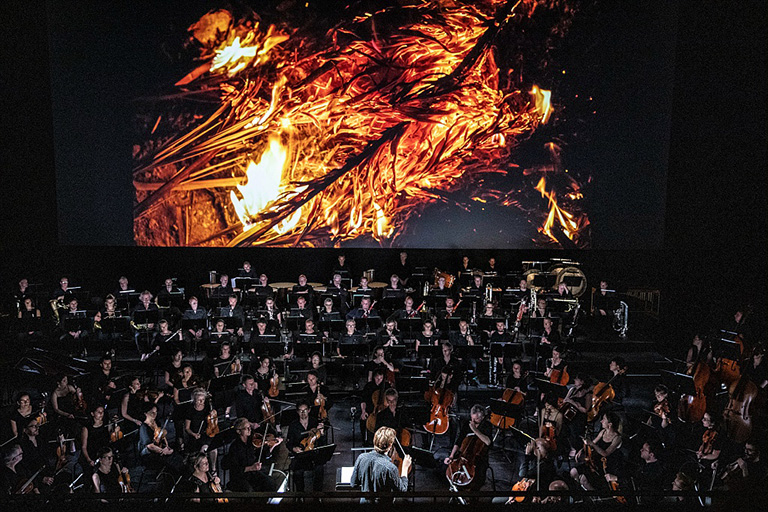
The 77th edition of the Holland Festival will open on Thursday 6 June with the special programme Rite of Spring in the Gashouder. The programme starts with Music in Common Time by Caroline Shaw with a film by Christiane Jatahy. Next, Stravinsky’s iconic Le Sacre du printemps will be played with a film by Evangelía Kranióti. Both works will be performed by the Radio Philharmonic Orchestra, in the first part together with Capella Amsterdam, led by conductor Karina Cannelakis.
The opening evening sets the tone for the programme with a range of elements and themes that will recur later in the festival. The festival programme came about in part with the input and inspiration of Brazilian theatre and filmmaker Christiane Jatahy, who is this year’s associate artist. At the Venice Biennale 2022, she was awarded the prestigious Golden Lion for Lifetime Achievement in Theatre. Jatahy was featured twice before at the Holland Festival.
Since 2019, the Holland Festival has had the pleasure of working with one or two different associate artists each year. The associate artist represents the voice of the maker, is a source of inspiration and serves as a conversation partner for us for more than a year. By presenting several works - new and old - by the associate artist, the festival introduces audiences to this maker’s oeuvre and their ‘universe’. Conversations with the associate artist in turn lead to further choices for other artists and performances, many of which have never been seen before in the Netherlands. 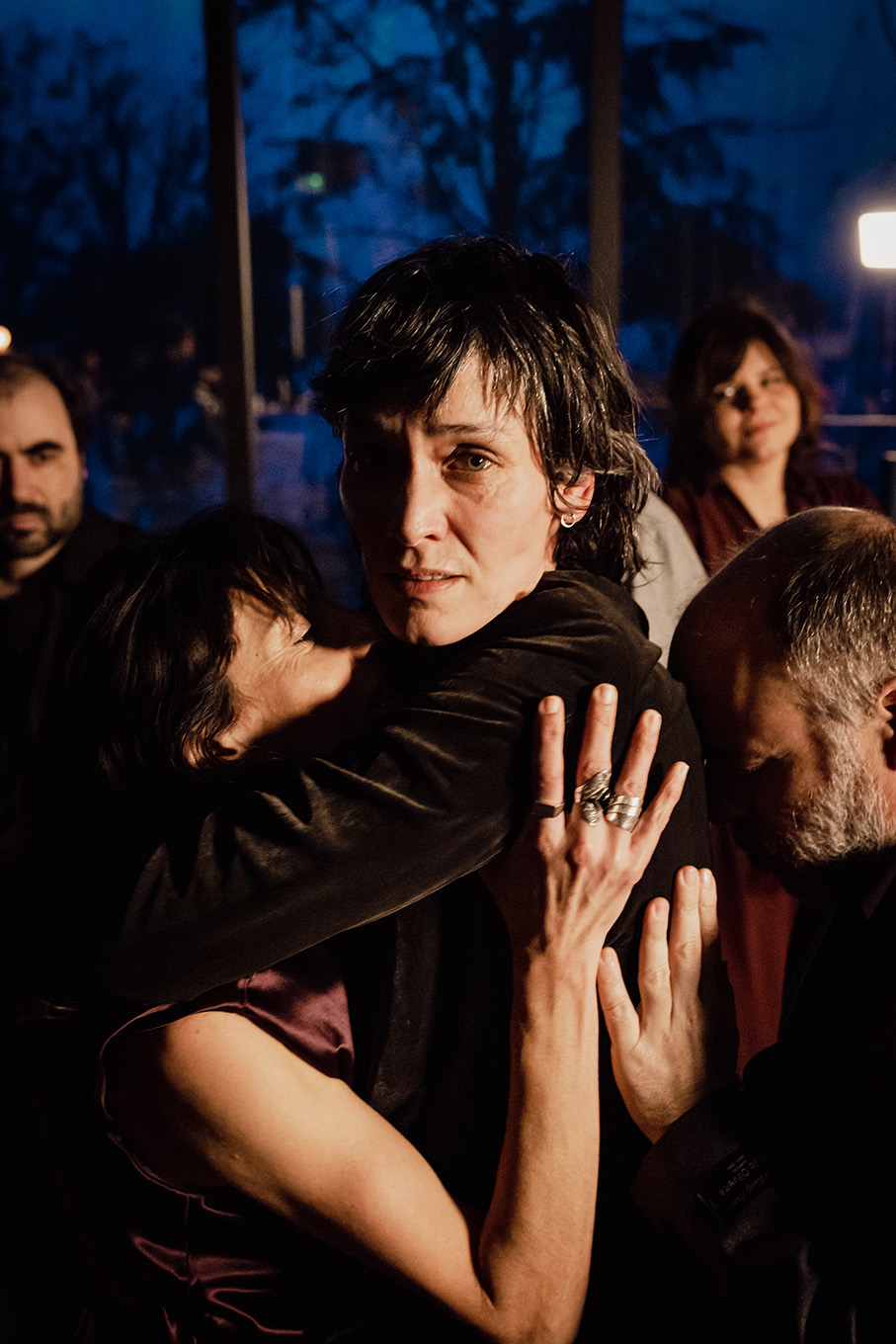
What is really happening?
With associate artist anohni last year, the festival’s overarching question was: what is really happening? Jatahy is concerned with this question as well, especially regarding Brazilian society, which she regularly takes as her subject in all its complexity, scrutinising existing mechanisms with her keen, critical eye. The form she chooses for this has everything to do with her background, as a writer, filmmaker and director. She will take a work of literature - a classic like Hamlet - or a documentary as a basis, and then turn these into new, current-day stories in which she draws attention to many different things. Meanwhile, she also plays with spectators’ perspective: is it fact or fiction, what am I looking at now, and who actually decides what I see?
Crossings
Jatahy sums up the essence of her work in the Portuguese word ‘cruzando’, or ‘crossings’ in English: the crossing of paths, the crossing where people, ideas and beliefs converge, the cross street with its many branches, but also the crossing to a different place. And even in the sense of crossing boundaries (and addressing this). The festival comprises many crossings, there where themes overlap, where connections between performances can be drawn, where one cross street leads to another. In order to familiarise you with the structure and context of this festival, I will focus on a few themes.
Home
For example, there is the idea of ‘home’. Where is my home? What do I call my home? What if I was born somewhere else than where I currently live? What if the language I speak is different from the language I dream in? What home do I actually identify with?
It is a topical issue: especially in a city like Amsterdam, where renting a home, let alone buying one, is nearly impossible. And where people of so many different nationalities and backgrounds find a home. Home is so much more than a roof over your head: having a home also means safety, recognition, being able to go on with your life...The project where we went into the city with Christiane Jatahy to talk with residents and artists about the idea of ‘home’ was also titled Crossings.
Georg Friedrich Haas will give a completely different interpretation of this topic in Through Poisoned Times, in which he talks about his autobiography and how he freed himself from his Austrian family’s Nazi ideology, where music was his escape. His phenomenal large-scale work 11.000 Saiten will be performed in the Gashouder by Klangforum Wien with 50 pianos.
Home - the political, economic and cultural reality
Home, in a wider context, is also about the systems we grow up in: the political, economic and cultural realities and historical circumstances that shaped us. Brazilian theatre maker Clayton Nascimento, for instance, is bringing the award-wining solo performance Macacos to Amsterdam, a protest monologue that addresses the unpunished systemic violence against black people in Brazil. It will be the first time this piece is performed outside of Brazil
Home - the interplay of norms and values
Home can also be seen in light of a higher social order, the interplay between norms and values, a set of rules we all need to comply with, in order to preserve the order. But what if these rules are broken? Or questioned? What if harmony is disrupted? The hallmark of Forced Entertainment, the English collective celebrating its 40-year anniversary and making their debut at the festival this year, is to show the absurdity of our existence by sceptically observing the system and the corresponding language we use. Their latest piece is titled Signal to Noise.
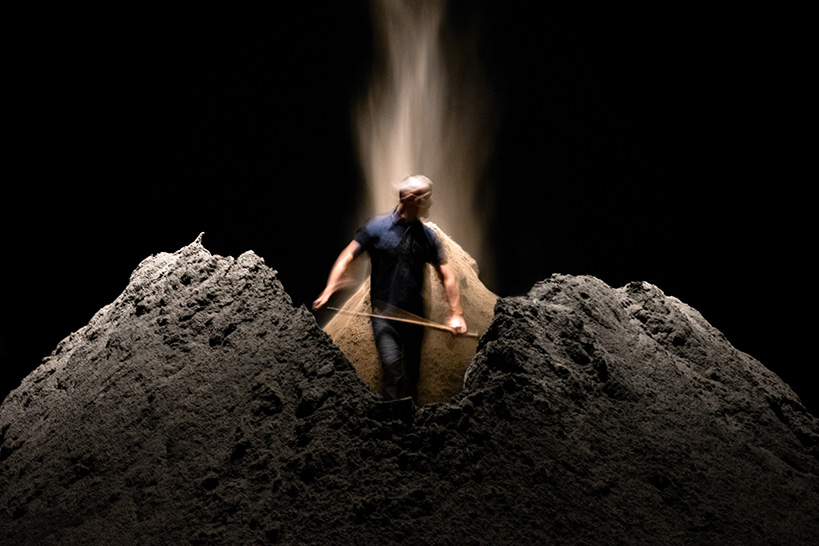
Someone else managing to get us out of our comfort zone is Dutch theatre maker Dries Verhoeven. In his living installation Everything must go, he asks the question: did you ever ‘forget’ to pay for something at the self-checkout? Canadian artist Viktor Pilon’s Sisyphe is a twelve-day performance marathon inspired by Albert Camus’ philosophical essay The Myth of Sisyphus, where he will move an enormous mountain of sand in a theatrical setting in an attempt at understanding the absurdity of existence.
Identity
In line with ‘my body is my home’, identity plays a key role in the upcoming festival. Grupo Cena 11, one of Brazil’s most important and daring dance companies, will perform Eu não sou só eu em mim (‘I’m not just me in myself’), an energetic piece that questions and affirms identity and unicity in Brazilian society through dance, technology and philosophy. This will be Grupo Cena 11’s first time performing in the Netherlands. Identity plays a major role in choreographer Trajal Harrell’s piece The Romeo as well. The Romeo is a universal dance, a historical journey that takes us through generations and cultures, but without specific dates.
The Faggots and Their Friends Between Revolutions is a musical theatre piece based on the cult 1977 novel of the same name by Larry Mitchell and Ned Asta. This musical version by composer Philip Venables and director Ted Huffman reworks the original text into a kaleidoscopic journey that blends music and storytelling. They create a world that constitutes a sharp critique of current-day capitalism, assimilation and the patriarchy, where radical change remains needed.
Together with the Hartwig Art Foundation, we will present Bizet’s Carmen, where director Wu Tsang will turn the ring of Royal Theatre Carré into a bullfighting arena. 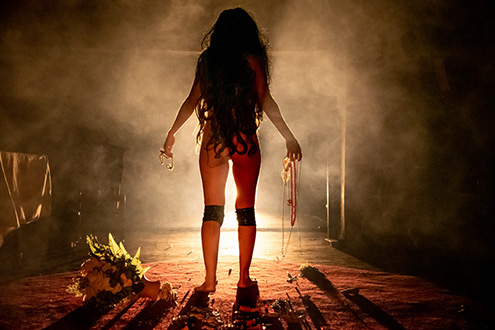
Shifting perspectives
And then there is the connection between theatre and film, fiction and reality and playing with spectators’ perspective. For Christiane Jatahy, combining theatre with cameras and film is a natural way of working, because this is how she sees the world. This connection between fiction and reality, using different sources translated to the performing arts, can also be seen in other pieces, such as in the personal story Stabat Mater of Janaina Leite and her mother, or with Tiago Rodrigues, who made the impressive and highly topical Dans la mesure de l‘ímpossible based on interviews with aid workers. As well as in The Second Woman, in which the camera follows actress Georgina Verbaan over the course of 24 hours in the same setting playing the same break-up scene with constantly changing counterparts in a hallucinatory theatre and film experience.
Dutch makers
The festival also features makers from the Netherlands, like HARDKOOR, a collaboration between Naomi Velissariou. the Netherlands Chamber Choir and Theater Utrecht, and Wunderbaum’s latest piece ALFA. Ruben van Leer and Boris Acket provide the visuals for The Bird of a Thousand Voices. Metropole Strings will play with Vitor Araújo in Levaguiã Terê, and Asko|Schönberg will perform in Mutability with music by 12 composers, several of which are from the Netherlands. Andy Moor from legendary band The Ex will perform with the Brazilian formation Meta Meta in Limite. We are working with 4 conservatories in order to invite 50 pianists to take part in the performance of 11.000 Saiten by Georg Friedrich Haas and will be showing work from visual artists Emma van der Put and Kwinnie Lê in Frascati. The Dutch National Ballet will dance Stravinsky Fairy Tales, and the Dutch National Opera will perform the opera Fidelio together with the Royal Concertgebouw Orchestra. In the theatre marathon The Second Woman, Georgina Verbaan plays the same break-up scene 100 times in 24 hours with 100 counterparts unknown to her.
Routes
We have drawn up a number of routes for easily navigating the programme: Brazil Today, HF Nightlife, HF at the Movies and My First Holland Festival.
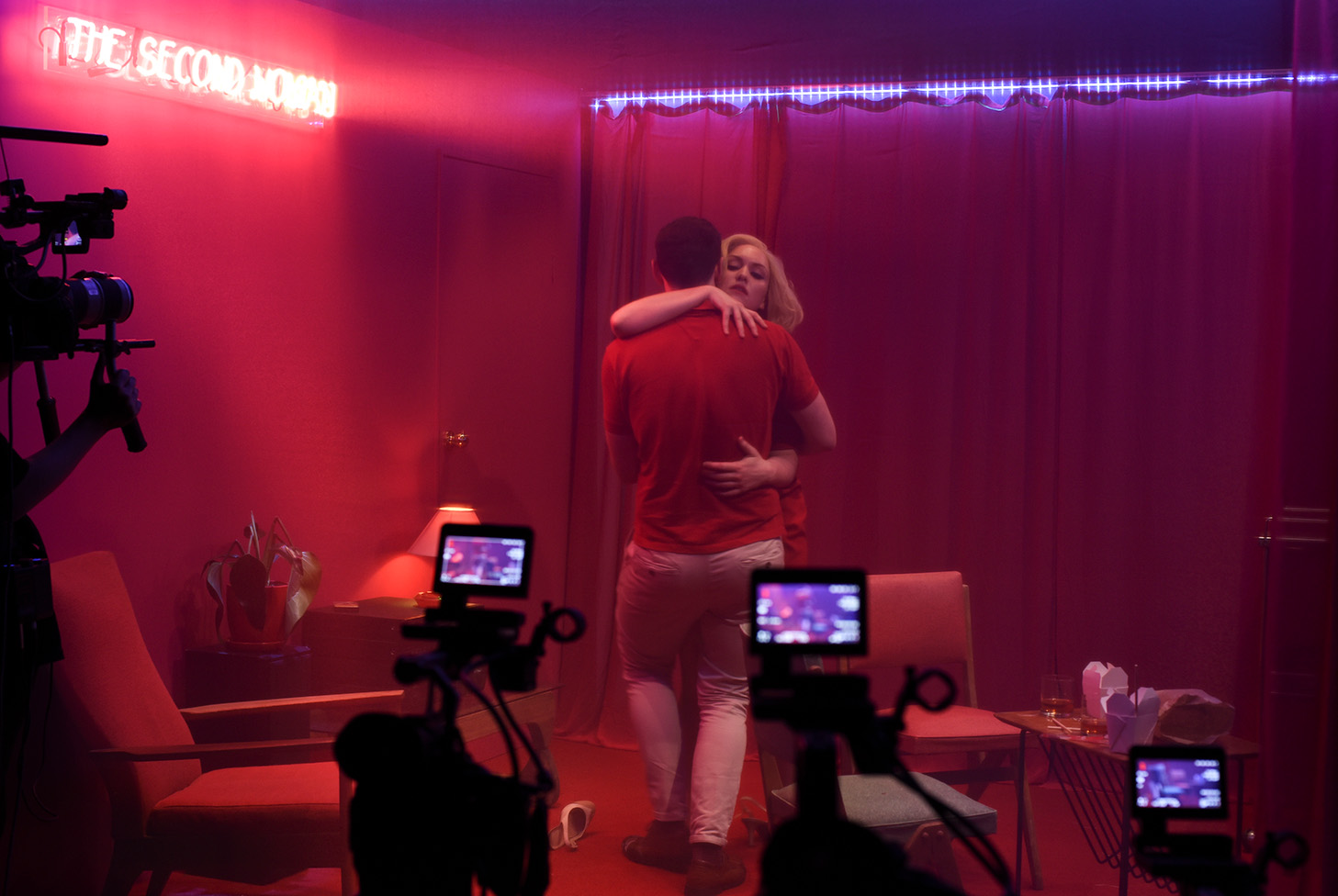 Festival weekends
Festival weekends
We have given extra attention to the four weekends of the festival with all kinds of in-depth programmes. In the weekend after the opening programme Rite of Spring, there will be five premieres and a club evening in Lofi.The second weekend starts with An Unapologetic Night Out with the queer choir, a pub quiz, performances and special cocktails. The third weekend takes place in Frascati with all sorts of in-depth activities and performances, including a dance party. And we will conclude the festival with the must-see 24-hour theatre marathon The Second Woman.
And then there’s this:
There are so many things happening in the world: the ongoing war in Ukraine, the terrible conflict between Israel and Hamas and the desperate situation of the people in Gaza. We still take too little responsibility for the planet, not everyone lives in freedom, receives education or even has enough to eat. Inequality is on the rise, also in the Netherlands. The political reality does not look favourable for the arts. Government cuts are looming on the horizon, but meanwhile we are all in a kind of limbo. Artists see the world around them and make art. Reflective, activistic, confrontational, contemplative, exploring, moving and beautiful. Especially in these turbulent times of intolerance and lack of understanding, we feel it is important to show the world’s complexity on stage, through the eyes of artists, in an environment where this is possible and permitted, in unbridled freedom, with originality and immeasurable imagination.
At Holland Festival, the makers’ artistic vision always comes first. They observe, reflect or take position in a quickly changing world. We expressly seek work from all parts of the world and makers who come from marginalised communities (or work with them) and who broaden our view of the arts. It is this confrontation that helps create interpersonal and intercultural awareness with the aim of understanding or embracing that which separates us. This is our vision and what motivates the Holland Festival team each day. It is what connects us and what will make for a meaningful experience in June, when we celebrate ground-breaking international performing arts together.
Emily Ansenk, director Holland Festival
Also on behalf of Kasia Torz, programming director theatre and dance, Jochem Valkenburg, programming director music and music theatre and Katinka Enkhuizen, programmer